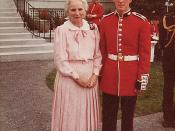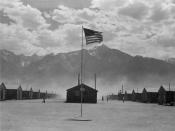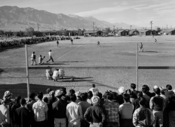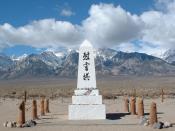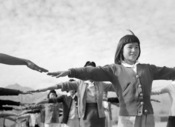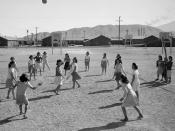Farewell to Manzanar Written by: Jeanne Houston James Houston Literal Level: 1. Give examples of how the people who establish the camp at Manzanar immediately show their lack of understanding of Japanese-Americans and their culture.
Examples of how the people show their lack of understanding of the Japanese-Americans and their culture can be seen right when they would arrive at the camp. The first day Jeanne and her family show up is right before dinner is being served. The cooks show their lack of understanding here by draping canned apricots over a bowl of rice as a sort of dessert. Well this did not go over very well with the Japanese because they never eat anything sweet with their rice; they will only eat a salty food with it. They almost didn't eat the meal but forgave the cooks and were polite about the situation by eating it anyways.
Another example is the lack of stales in the bathrooms.
Japanese like to have their privacy especially while going to the bathroom. It was like the ultimate disgrace because they are a very modest culture. One woman had the idea to use a refrigerator box as a sort of shield that could be placed on the floor around the person so that you could have like a little stall. Mama was very grateful. She had been waiting in line for a spot when the woman had finished. She asked mama if she would like to use it and mama graciously accepted. The woman later on told her she could keep it because she knew where to get more. That idea helped save their modesty.
The last main thing that had occurred was the small barracks. Again this had to do with their modesty. The barracks were shared, or should I say crammed with twelve people. There was one hanging light from the ceiling and oil stove for warmth in a corner with a few windows and one door. Each person had a cot, a pillow and two blankets. The pillows were usually stuffed with straw because the cots they slept on were much too uncomfortable. Most people divided the barracks in to their own rooms for that little bit of privacy by stringing one of their blankets up from one wall to the other. On top of all that was going on there were knotholes on the walls and on the floor which sand could get in to the barracks because of the wind. The Japanese like to have their living quarters clean and the sand always messed everything up. They would take pop cans and cut them up to be used as covers for the holes. They would nail the pieces of pop can over the holes so no more sand could get in.
These are the most of the main misunderstandings of the Americans not knowing where the Japanese were coming from with their culture.
2. Jeanne's papa changes in many ways between Pearl Harbor Day and the day he dies. Discuss some of the changes in Papa's role in his family.
Papa's role in the family changes a lot form the day Pearl Harbor is attacked to the day he dies.
The morning of the attack Papa was out on his boat with a lot of the other Japanese fishermen when they hear about the attack and come in to shore. Papa at this time is the main supplier for money and head of the household for his role.
A few days later the FBI come to Long Beach where they live and arrest Papa for being a spy for the Japanese and take him to Fort Lincoln in Minnesota along with a lot of the other fishermen there. At this point he has no real importance in helping the family in anyway for a while.
Months pass and the family has already moved in to the internment camp at Manzanar before the government decides they don't need to keep him in custody any longer and send him to Manzanar to be with his family. During that time he sent a little money to them that he had earned but again hadn't had much affect on the family and how it was being run.
After about a year being held, interrogated and being forced to sign a waver saying that his is loyal to the U.S. and not to Japan that they let him go. When he arrived it was to a bit of a shocker. He was now head of the household again but he didn't help it in anyway by either working to get money for the family or just being a good father figure. He mainly kept to himself for the first months brewing and drinking home made concoctions he had learned to make from some of the other prisoners at Fort Lincoln. He would just sit there and drink his latest batch of rice wine or apricot liquor. After getting drunk he would usually fly into a fit of rage and beat Mama or take it out on one of his children. He kept to himself and tried to stay out of Manzanar society. He stayed like this almost until the closing of the camp. In this period of time he had much affect on what the others in the family would do but not help in anyway to support it. He seemed to put everyone down for the things they did and accomplished no matter how much it might have meant to that person.
Towards the end of the war until the closing of the camp he did about the same thing he had when he arrived at camp only know he was getting more involved with the community the Manzanar had grown into. He now had drinking buddies that would come over and just drink and talk of what should be done after the war and when the camp was to close down for good. He started helping work for money and became more of a respectable person not only to his family but also to the other people living at the camp at the time.
Papa was always one for style and on one of the last days they spent in camp he went into the town of Lone Pine and bought them a blue colored Nash that needed a lot of work. He had sobered up some for a while right before that for about two months but when he came back in the Nash he was also drinking from a bottle of whiskey he had sitting next to him in the passenger seat. By this time everyone thought he had almost lost his mind. His role in the family now was to support the family again. He had to find a place to live and he also had to find work.
They moved to L.A. at first and became a worker at a fishery being on the slim line working along side Mama. Later on he became a berry farmer up near Santa Cruz and that is where he stayed until he died. In this last part of his life his role was to keep the family going and make sure everyone was taken care of. By now he had given up drinking for good for the reason he had once woken up out of a drunken blur and throw up blood. That day he had sworn off the boos.
Papa's role in the family changed many times in his life and made him a well-rounded person in the end to have earned the respect of his family.
Interpretive Level: 1. Give at least three examples of stereotyping and prejudice that Jeanne encounters.
There were three times that I can think of when Jeanne encounters people either stereotyping her or just being raciest. She was stereotyped when she tried to join the girl scouts because they didn't want to have a Japanese-American in their troop. She was again stereotyped when she was a senior and was almost not elected to be Carnival Queen. The third a woman told her that all "Japs"ÃÂ should go back to Japan and then spit at them.
When she was stereotyped the first time by trying to get into her friends Girl Scout troop her mother, the leader of the troop, said no Japanese are allowed. Which I find kind of stupid on there part because the girl scouts weren't meant to be for just little stuck up American girls but for any girl who wanted to have a good time and be in girl scouts. It just made them look bad. Yet when they told her this she just blew it off like she didn't care if she joined or not. Which in all fact she didn't care but it made her think why would someone not like me and not pick me for something like girl scouts just because of my race.
The second time she was stereotyped was during her senior year in high school in Santa Cruz when she was named Carnival Queen. She had won the popular vote by the students when it came time to do the voting. When the contestants came out everyone knew whom they wanted for as queen. The only problem was that the a few of the staff didn't feel that they should have a Japanese girl be the queen and that a Caucasian girl would be better because they were afraid of what might happen. They had never had a Japanese person be anything special there including the Carnival Queen. One of her friends helped her out by raising a little hell in the office saying how he would go tell the entire student body what was happening if they didn't stop trying to rig the election by stuffing the box. Well this time she was accepted and was crowned queen that year despite that little "mishap."ÃÂ The final time that anything happened to her that I can remember is as she was sitting down with a friend a woman had walked up to them and told them, "ÃÂWhy don't you Japs go back to Japan where you belong,"ÃÂ then spit at them as she walked away. This made her think of whom she really was and if she wanted to be that someone that everyone says she is. This was a bad showing of racism.
Jeanne had gone through a lot and I am sure she has let all that go even what that woman had said to them.
2. Compare and contrast Manzanar to a typical American town.
To compare Manzanar to a typical American town is not the easiest thing to do. They were probably both so similar that if you put them next to each other you couldn't tell them apart. Manzanar had a hospital, a church, public restrooms, sport teams, police and fire stations, a school, and a public park.
There are some major contrasts though between these two that I just thought of. At Manzanar there were guard towers, barbed wire fences, barracks instead of housing, public mess halls where everyone went to eat. They had dirt roads, no electricity, no plumbing, everyday things that get taken advantage of and no one really pays attention to. So I guess in the long run Manzanar was both very much alike while at the same time very much different than your normal American town.
